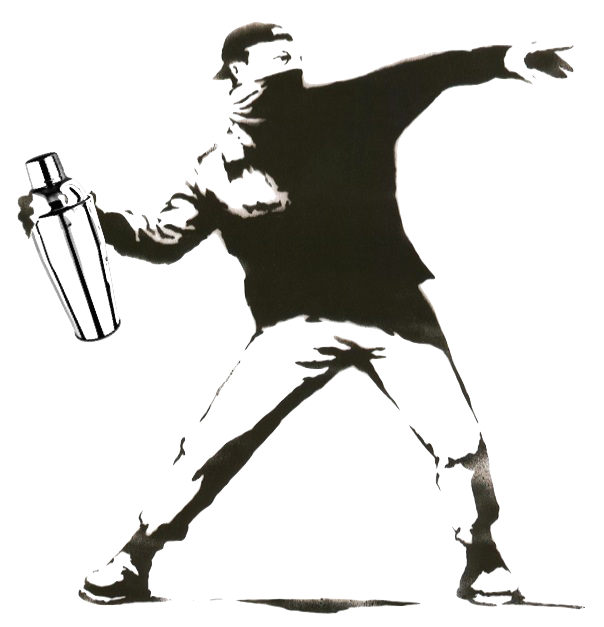What does London Dry Gin mean?
London Dry Gin basically means gin with no sugar added.
Many spirits definitions are complicated, tedious laws. It's the ideas behind them that you need to understand because the laws are for lawyers. Example: "Is it illegal to punch someone?" Yeah, like most of the time, but sometimes not, like in defense, but mostly, avoid situations that involve punching people. Laws are for lawyers; punching is for boxers. London Dry Gin is a legal definition, of gin, legally recognized in most countries to mean no sugar added.
But that right there, that is where laws get dumb. Ask any bar nerd, and they'll tell you the same, except, I already falsely informed you, a distiller can add sugar to London Dry Gin: up to .1 grams per liter. A teaspoon can hold four grams of sugar, so divide that by four, and then divide that by ten and that is the maximum amount of sugar one may add to London Dry Gin, by law. If you found that tedium interesting, well, you may be more boring than me, hey, want to talk GoT fan theories? This addition of sugar is essentially a way in which distillers can put a flavorless "fingerprint" on gin to help discern it, on a chemical level, from bootlegged gin. I ask you, "was that a necessary part of the law to understand?
This why I advocate for ideas. In a mix of laws and core ethics, there are, to pick a number out of the air, about six styles of gin. Some of these are strictly defined, some are universal ideas that history and nerds agree on. Those sixish styles are:
- Juniper Flavored Spirits
- Gin
- Distilled Gin
- London Dry Gin
- New Western Gin
- Gin Liqueurs (which are really just liqueurs)
A broad stroke, melange of laws and ideas on what those mean are as follows:
Juniper Flavored Spirits
Long before "gin," we put delicious juniper in beer, wine, and spirits. Sometimes we distilled it into a complex spirit like genever: a base spirit like whiskey with botanicals like gin, or wacholder: something like a German juniper schnapps.
Gin
A spirit that you add flavors to, mostly juniper. "Gin," is a low bar, if a spirit is flavored with mostly juniper flavor, in any way, it can be called "gin." This designation is the "pass/fail" of the spirits industry.
Distilled Gin
A step up! At least everything that flavors this gin is distilled— but not necessarily in the actual still. If one takes a neutral spirit, fills a bathtub, and then added distilled juniper, one has, in the Al Capone tradition made distilled gin! Perhaps is a lowbrow explanation but in reality, there are are many lowbrow distilled gins. But let there be a glaring exception to every generalization: Hendrick's Gin is distilled is a classic and classy way, but has distilled cucumber and distilled rose petal added after, thus losing its "London Dry Status." So Hendrick's is terrible. No! It is just made with different production methods.
London Dry Gin
Pretty simple: all botanicals are in the still, and only water may be added after distillation. London Dry Gin needn't be made in London (most are not), it is not a geographic origin. The term and the style comes from an attempt to refine gin's image from sugar-sweetened, turpentine blended Old Tom Gins that pedestrians drank in the 18th century.
New Western Gin
Yesterday I wore a red aloha shirt featuring the drawings of Ernst Haeckel, with a green sports coat, jeans, and boots, because in America, we do whatever we want. New Western Gin isn't a legal term, (most of it is considered London Dry Gin legally speaking) it's a style of gin that features non-traditional botanicals. It's a badge of pride and a mark of derision. Can't start that rant now.
Gin Liqueurs (which are really just liqueurs)
Think Sloe Gin, Damson Plum Gin, and the lost world of fruit gins. These are gins infused with fruits and sweetened with sugar. While they could be lumped in with the "just gin" category, they should be respected as quality liqueurs and considered a unique category.
I'd be remiss to not mention and would get "well actually..." comments about omitting the concept of gins that have geographic origins. I know of two, Xoriguer (geographic origin: Gin de Mahón) from Menorca in Spain, Vilnius (geographic origin is also Vilnius) from Vilnius Lithuania. Plymouth Gin (geographic origin also Plymouth) from Plymouth used to be recognized by the European Union, but the distillery's owners, Pernod Ricard, withdrew the geographic origin. These are all stylistically London Dry Gins, and while each could have been their own "wanky category of one, " respectfully, I'd say, no.

